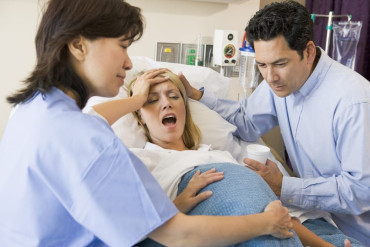FAQ About Maternal Intrapartum Fever

When a woman is in active labor, her vital signs must be monitored closely by medical professionals. They will check for various signs that may indicate something is wrong, including any elevation in temperature. If a woman has a fever during labor, it may result in complications for her and her baby.
What Exactly Is Maternal Intrapartum Fever?
A body temperature that rises above normal (99.4 degrees F) while in labor is called maternal intrapartum fever. It’s also known as intrapartum maternal fever, maternal intra-partum fever, and pyrexia in labor. Some medical professionals regard maternal intrapartum fever as synonymous with chorioamnionitis, an infection of the tissue and amniotic fluid surrounding a baby in the womb. However, an elevated fever during labor can also be noninfective.
Maternal intrapartum fever happens in about one to two percent of deliveries, and it’s frequently associated with maternal and neonatal complications.
What Is Considered A Fever In Labor?
A body temperature greater than 100.4 degrees F is considered intrapartum fever, and it’s a cause for concern.
What Happens When A Mother Gets A Fever During Labor?
When a pregnant woman develops a fever during labor, it is often difficult for medical professionals to make a proper diagnosis because various things can cause an elevated temperature. It could be as simple as upper respiratory or urinary tract infections or as serious as chorioamnionitis. Diagnosis can be further complicated because the stress and anxiety of labor can also cause body temperature to rise. However, studies have shown that when a maternal fever over 100.4 degrees F is present with at least two of the following conditions is associated with a higher likelihood of chorioamnionitis and the resulting risk of neonatal sepsis:
- Fetal tachycardia
- Maternal tachycardia
- Uterine tenderness
- Maternal leukocytosis (high white blood cell count)
- Purulent or foul-smelling amniotic fluid
How Does Maternal Fever During Labor Affect The Baby?
Maternal intrapartum fever can lead to numerous complications for mother and baby, including both infectious and noninfectious conditions.
A sudden spike in maternal fever during labor that includes the administration of an epidural may result in serious risks to the baby in an otherwise low-risk delivery. For example, babies whose mothers had an intrapartum fever over 101 degrees F were two to six times more likely to have low Apgar scores, need ventilations, and have seizures.
Other neonatal consequences of maternal intrapartum fever include:
- Hyaline Membrane Disease
- Meconium Aspiration Syndrome
- Intrapartum stillbirth
- Early neonatal or infant death
- Asphyxia
- Neonatal encephalopathy
- Cerebral palsy
- Septicemia
- Meningitis
- Pneumonia
How Is Intrapartum Fever Treated?
Maternal intrapartum fever is often treated by a team of specialists, including the obstetrician, anesthetist, microbiologist, physician, and neonatologist. All patients with intrapartum fever should have their blood pressure, respiratory rate, and pulse checked every 15 minutes during labor and the postpartum period. Broad-spectrum antibiotics are usually administered when an infection is pre-existing or identified during labor.
General measures should be performed to reduce the mother’s temperature by providing hydration (IV or orally), removing clothing and blankets, lowering room temperature, applying cool compresses, and providing fever-reducing medications like Tylenol.
Are Intrapartum Fever Complications Medical Malpractice?
Medical malpractice related to intrapartum fever complications typically occurs when women in labor are not properly monitored. During labor, if vital signs are not monitored, and doctors or other medical professionals don’t notice that a woman’s body temperature is elevated, both mother and baby are at risk of injuries. When injuries occur, and an experienced birth injury attorney can prove that it was due to improper monitoring, it may be considered a case of medical malpractice.
Can Ross Feller Casey Help?
Cases that involve intrapartum fever and subsequent complications are challenging to prove. That’s why you must hire a medical malpractice lawyer that has experience with these types of cases. At Ross Feller Casey, we have a team of medical doctors on staff who are knowledgeable about intrapartum fever cases. They can review medical records and provide assistance to the lawyers working on your case.
Our attorneys understand that when serious injuries occur to your newborn, it’s hard to consider anything besides your baby’s care. But you may be entitled to compensation for your damages, which will help ease your family's financial burden of ongoing medical expenses. We are here to handle the legal process for you.
Contact the office of Ross Feller Casey for a free case evaluation. We will help you determine how best to proceed with your claim. You won’t pay anything out-of-pocket. We work on a contingency basis.
Disclaimer: Ross Feller Casey, LLP provides legal advice only after an attorney-client relationship is formed. Our website is an introduction to the firm and does not create a relationship between our attorneys and clients. An attorney-client relationship is formed only after a written agreement is signed by the client and the firm. Because every case is unique, the description of awards and summary of cases successfully handled are not intended to imply or guarantee that same success in other cases. Ross Feller Casey, LLP represents catastrophically injured persons and their families in injury and wrongful death cases, providing legal representation in Pennsylvania and New Jersey.





